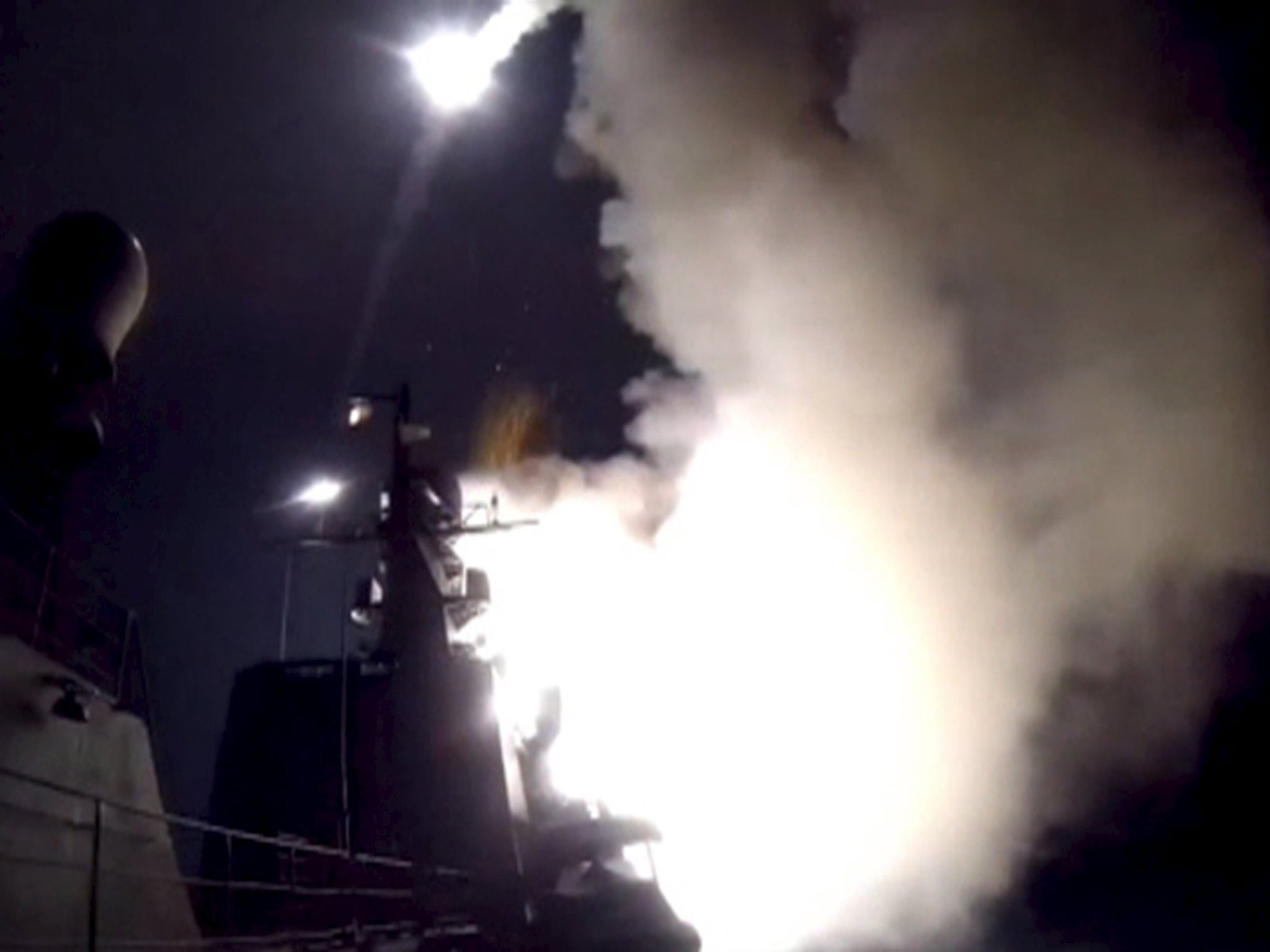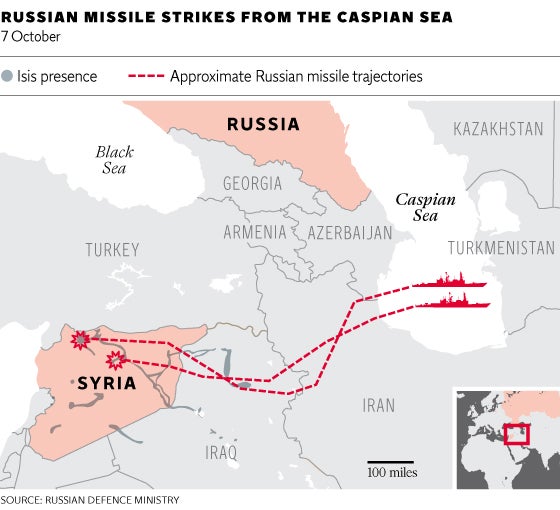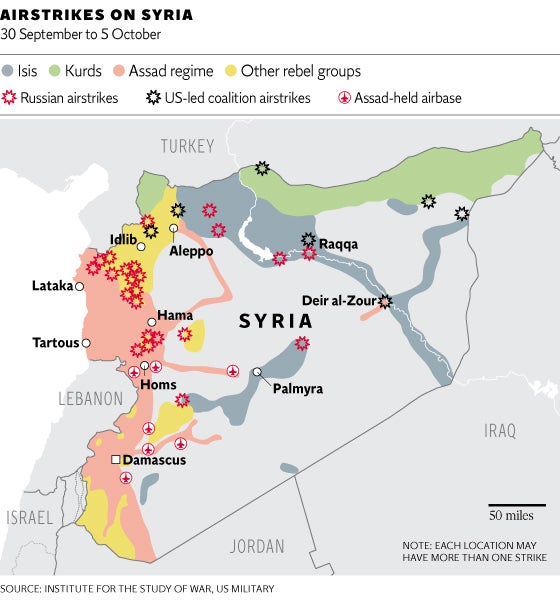Russia launches missiles at 'Isis targets' in Syria from Caspian Sea - as Turkey claims Moscow is targeting rebels
The Defence Minister confirmed the launch to Russian media

Your support helps us to tell the story
This election is still a dead heat, according to most polls. In a fight with such wafer-thin margins, we need reporters on the ground talking to the people Trump and Harris are courting. Your support allows us to keep sending journalists to the story.
The Independent is trusted by 27 million Americans from across the entire political spectrum every month. Unlike many other quality news outlets, we choose not to lock you out of our reporting and analysis with paywalls. But quality journalism must still be paid for.
Help us keep bring these critical stories to light. Your support makes all the difference.
Russia has launched missiles at targets in Syria from warships in the Caspian Sea in the first major combined assault across the air and ground in Moscow's escalating campaign in the war-torn country.
The missiles were aimed at Isis targets, according to the Kremlin.
They were deployed as Russia's ally, Syrian President Bashar al-Assad, started a ground offensive in rebel-held areas where jihadists from the so-called Islamic State are thought not to have a presence.
The Russian Defence Minister Sergei Shoigu said on Russian television that 26 missile strikes were launched on Wednesday from four warships, destroying all 11 intended targets, in an attack which adds a new level of complexity and violence to the Syrian conflict.

Launched from the Caspian sea, which lies between countries including Russia, Azerbaijan and Iran, the missiles flew approximately 1,400km (900miles), according to a Russian officer.
Mr Shoigu said no strikes were targeted at civilian areas.
Andrei Kartapolov, of the Russian General Staff, later told Russian news agencies that Moscow had attacked using warships in order to cast the “over unpopulated areas”.

Dramatic footage of the missiles being launched and lighting up the night sky were broadcast on Russian television.
A military source quoted by Syrian state television said that Russian ships targeted 11 Isis positions in Raqqa, Aleppo, and Idlib, destroying bomb factories, command posts, weapon supply depots, and "terrorist training centres".
The announcements were met with deep scepticism, as Turkish Prime Minister Ahmet Davutoğlu claimed only two out of 57 Russian air strikes in Syria hit Isis targets.
The rest, he said, targeted ‘moderate opposition groups’, according to the Daily Sabah.

Describing Russia's strategy "tragically flawed", US Defence Secretary Ash Carter he once again accused Moscow of deviating from its pledge to only target Isis. The Russian defence ministry hit back by launching the same accusation at the US air force.
A source from British military told The Independent that one in 20 missiles have struck Isis targets.
However, President Vladmir Putin later said it was too early to address the results of Russian military actions in Syria, and ordered Mr Shoigu to continue co-operating with the US, Turkey Saudi Arabia, Iran, and Iran on the conflict.
Moscow unexpectedly started an air campaign in Syria in late September, assuring that it would only target Isis. However, it is feared that the Russian military is also attacking groups opposed to Mr Assad's government, who the UN has accused of carrying out war crimes against its own Syrian citizens.
Russia's action, largely aimed at central and north-western Syria which are the gateways to Mr Assad’s Damascan strongholds, appeared to have given Mr Assad's government confidence to regain lost ground.
Some commentators have taken an apocalyptic view of what lies ahead.
Pavel Felgenhauer, an independent military analyst in Moscow, forecast “ right now they are just softening up the opposition. Then will come the ground offensive, it will be us in the air and Syria, Iran and Hezbullah on the ground. It’s going to be a terrible bloodbath, tens of thousands will be killed and the consequences for Europe will be even more refugees.”
Under the cover of Russian airstrikes on Wednesday, the Syrian army and allied fighters carried out ground attacks on insurgent positions.
The Britain-based Syrian Observatory for Human Rights said a government offensive began on four fronts early on Wednesday in the north-western provinces of Idlib and neighbouring Hama.
Observatory director Rami Abdurrahman described it as “the most intense fighting in months.”
The group, which has a network of activists in Syria, said that government forces are focusing on the town of Morek, on the highway which connects Damascus with the northern city of Aleppo which has been under rebel control since 2012.
A total of 37 Russian air raids have taken place in the area since Moscow launched its operation a week ago, according to the observatory. Two helicopters believed to be Russian were seen flying at a low atltitude in Morek. However it remains unclear whether they were owned by the Syrian army as it has Russian-made helicopters in its arsenal.
Major Jamil al-Saleh the leader of the Tajummu Alezzah US-backed rebel group, also confirmed the ground offensive but said it had come from three fronts, including Latamneh, north of the Hama province.
Matthew Rycroft, the UK's UN ambassador said Russia suport for Mr Assad Syria will merely strengthen Isis, and force much of Syria's Sunni population “into the arms” of the extremist group.
He added that anyone who has looked at a map of where the Russian military has targeted will see that thei strikes are largely “are against what we consider the moderate opposition to Assad, the very people that we need to be part of the future of Syria”.
The missiles launched from the Caspian sea came a day after Mr Shoigu said that Russia had called on foreign military attaches to supply Moscow with intelligence on Isis positions, as a US-led coaltion carries out separate missions in Syria and Iraq.
Mr Shoigu also said Russia was prepared to a document with the US to coordinate actions in Syria.
Additional reporting by Associated Press and Reuters
Subscribe to Independent Premium to bookmark this article
Want to bookmark your favourite articles and stories to read or reference later? Start your Independent Premium subscription today.
Join our commenting forum
Join thought-provoking conversations, follow other Independent readers and see their replies
Comments